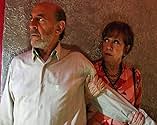Une femme retraitée passe ses journées à espionner tout le monde dans son quartier, jusqu'à ce qu'elle croie voir un ancien ministre de la Justice commettre un meurtre et devienne un informa... Tout lireUne femme retraitée passe ses journées à espionner tout le monde dans son quartier, jusqu'à ce qu'elle croie voir un ancien ministre de la Justice commettre un meurtre et devienne un informateur de la police.Une femme retraitée passe ses journées à espionner tout le monde dans son quartier, jusqu'à ce qu'elle croie voir un ancien ministre de la Justice commettre un meurtre et devienne un informateur de la police.
- Récompenses
- 16 victoires et 13 nominations au total
Photos
Histoire
Le saviez-vous
- AnecdotesBased upon Hitchcock's "Rear Window"
- ConnexionsReferences Fenêtre sur cour (1954)
Commentaire à la une
Writer Marcos Bernstein ('Central Station') takes a step forward as Director of yet another soulful and touching film about aging and the loneliness and isolation that surrounds our older generations. Together with Melanie Dimantas he has written a story that is not only intriguing as a suspense tale, but it is also one of the most moving love stories between older people that has graced the screen.
Regina (Fernanda Montenegro) lives alone with her devoted dog Betina, her only visits to family are with her grandson: she rarely sees her son's home as her son is still friends with her estranged husband. Regina has found a hobby to fill her days - she has become a volunteer police informant for the Copacabano police, visiting bars where drug deals are rampant and then reporting the findings to the police. Her high-rise apartment faces another like apartment across the street and she spends her idle hours watching her neighbors through binoculars, not in a snoopy way but as a manner of relieving her boredom of solitude.
One evening she observes an older man give an lethal injection to his wife, and thinking she has observed a murder she notifies the police who respond, only to discover the older man is Judge Carmago (Raul Cortez) and thus dismiss the intrusion as a false call by Regina. Regina knows what she saw and despite the abuse she receives from the policeman Alcides (Luiz Carlos Persy) she is intent on investigating the 'crime'. She stalks Carmago and eventually Carmago confronts her behavior, stating that if she has questions of him she should join him for lunch or dinner. The two lonely older people gradually get to know each other and a relationship ensues that surprises them both. Regina's shell of emotional protection is cracked and the two explore the vulnerability of feelings usually reserved for the young. How Regina's life is altered by this adventure makes for an illuminating finale to the film.
Fernanda Montenegro is luminous as Regina. She is an actress in her late seventies who is able to invoke tremendous responses from an audience, so multifaceted are her talents. Raul Cortez likewise is a veteran actor (his first film was in 1957) who has depth of character and technique that makes his role gleam. This film is a brave one, a film unafraid to address delicate issues about love among the elderly and achieve a stunning level of dignity and discretion that binds the viewer to the story. The atmosphere is enhanced by the minimal music score from Guilherme Bernstein Seixas and by the clever cinematography of Toca Seabra. This is a lovely film that should appeal to all audiences, especially those who fell in love with Fernanda Montenegro in 'Central Station'. Grady Harp
Regina (Fernanda Montenegro) lives alone with her devoted dog Betina, her only visits to family are with her grandson: she rarely sees her son's home as her son is still friends with her estranged husband. Regina has found a hobby to fill her days - she has become a volunteer police informant for the Copacabano police, visiting bars where drug deals are rampant and then reporting the findings to the police. Her high-rise apartment faces another like apartment across the street and she spends her idle hours watching her neighbors through binoculars, not in a snoopy way but as a manner of relieving her boredom of solitude.
One evening she observes an older man give an lethal injection to his wife, and thinking she has observed a murder she notifies the police who respond, only to discover the older man is Judge Carmago (Raul Cortez) and thus dismiss the intrusion as a false call by Regina. Regina knows what she saw and despite the abuse she receives from the policeman Alcides (Luiz Carlos Persy) she is intent on investigating the 'crime'. She stalks Carmago and eventually Carmago confronts her behavior, stating that if she has questions of him she should join him for lunch or dinner. The two lonely older people gradually get to know each other and a relationship ensues that surprises them both. Regina's shell of emotional protection is cracked and the two explore the vulnerability of feelings usually reserved for the young. How Regina's life is altered by this adventure makes for an illuminating finale to the film.
Fernanda Montenegro is luminous as Regina. She is an actress in her late seventies who is able to invoke tremendous responses from an audience, so multifaceted are her talents. Raul Cortez likewise is a veteran actor (his first film was in 1957) who has depth of character and technique that makes his role gleam. This film is a brave one, a film unafraid to address delicate issues about love among the elderly and achieve a stunning level of dignity and discretion that binds the viewer to the story. The atmosphere is enhanced by the minimal music score from Guilherme Bernstein Seixas and by the clever cinematography of Toca Seabra. This is a lovely film that should appeal to all audiences, especially those who fell in love with Fernanda Montenegro in 'Central Station'. Grady Harp
Meilleurs choix
Connectez-vous pour évaluer et suivre la liste de favoris afin de recevoir des recommandations personnalisées
Détails
- Date de sortie
- Pays d’origine
- Site officiel
- Langue
- Aussi connu sous le nom de
- The Other Side of the Street
- Lieux de tournage
- Sociétés de production
- Voir plus de crédits d'entreprise sur IMDbPro
Box-office
- Budget
- 5 200 000 R$ (estimé)
- Montant brut aux États-Unis et au Canada
- 55 459 $US
- Week-end de sortie aux États-Unis et au Canada
- 4 316 $US
- 27 févr. 2005
- Montant brut mondial
- 55 459 $US
- Durée1 heure 37 minutes
- Couleur
Contribuer à cette page
Suggérer une modification ou ajouter du contenu manquant

Lacune principale
By what name was L'autre côté de la rue (2004) officially released in Canada in English?
Répondre




















